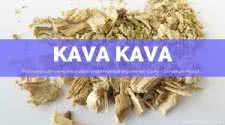Kava Kava for Anxiety - Mellow out with Natural Kava Herbal Remedy

Nature Offers Many Excellent Herbal Options for Optimal Health Benefits
Most of us don't have the luxury of training, eating and sleeping whenever we want. You know why? 'Cause we have jobs!
Things like jobs, your boss, spouse, girlfriend or boyfriend are all possible stress - or anxiety - provoking stimuli,
and excess stress can prevent you from reaching your physical anti mental potential. What better way to combat that
anxiety than with a popular compound from the South Pacific islands? Could it he time to throw out the Valium and take
kava (aka kavakava) instead? As they've done with other herbal remedies, scientists have finally brought kava from the
jungles into the lab, and guess what - they're now confirming what has been known for centuries by those who use the
stuff.
Kava roots contain fat like corn-pounds called kava lactones, which are said to have anti-anxiety muscle relaxant and
pain-relieving effects. In a study done at the department of psychiatry at Friedrich-Schiller University in Jena,
Germany, scientists examined 101 patients suffering from anxiety of non psychotic origin, meaning they were anxious
but not crazy. The researchers conducted a 25-week placebo-controlled, double blind experiment on the effects of a
special kava-kava extract identified as WS 1490. Using a measure called the Hamilton Anxiety Scale, they found the
kava-kava extract to have superior impact over the control condition, particularly from eight weeks on. Just as
important, side effects were no different between the kava and control groups. These investigators report that kava may
be an alternative to many prescription medicines used to treat anxiety disorders.
Interestingly, nearly two months passed before significant differences were seen in study subjects, so this isn't a
quick fix. Work in mice has shown that kava has an antinociceptive or analgesic effect (it decreases the sensation of
pain). But beware: Kava may have some undesirable side effects. Some users can suffer from a scaly eruption on the skin,
the cause of which is unknown. In a study of aboriginal communities reported in the Medical Journal of Australia,
scientists found that kava users were more likely to have a scaly rash, complain of poor health and have a puffy face.
Now, that doesn't necessarily mean kava itself is bad for you, though it may signify that kava users neglect other
aspects of their health.
Even though it's a natural product, kava can clearly have potential for abuse. The August 1991 edition of the University
of California at Berkeley Wellness Letter tells the tale of a Utah driver who had 16 cups of a steeped kava beverage and
was stopped by police. He was subsequently convicted of DWT, though his blood alcohol level was zero. Don't exceed 300
mg daily and recognize that you should not use kava if you're pregnant, nursing, taking prescription anti-anxiety
medication, drinking alcohol or operating machinery (that includes heavy squats!).
You're right in assuming that kava isn't a traditional bodybuilding supplement. But instead of treating yourself with a
beer or glass of wine to relax when you get home from a hard day's work or workout, perhaps trying a little calorie-free
kava for a few months might do to you wonders. As with anything else, moderation is key.